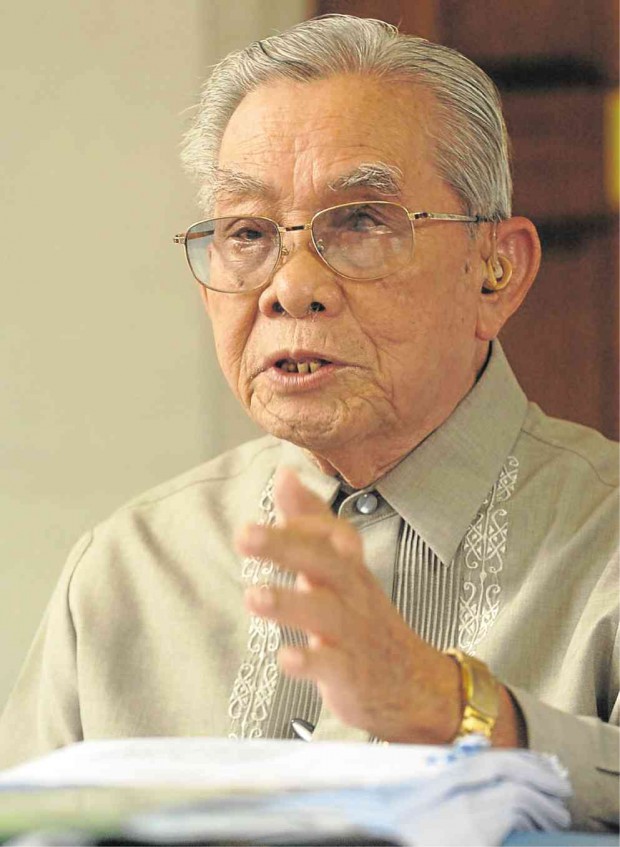“A brave, committed individual who lit a candle during the deep darkness of the dictatorship.”
This was how Malacañang described former Senate President Jovito Salonga, who died Thursday. He was 95.
“With heads bowed in grief and respect, we extend our deepest sympathies to the family of Sen. Jovito Salonga,” presidential spokesperson Edwin Lacierda said in a statement that extolled the statesman for his contribution “to the restoration of our democratic way of life after the triumph of people power.”
The Palace official added: “(Salonga’s) life stands as a reproach to those who would put personal gain ahead of public service, who would lower the standards of public discourse, and who would sacrifice human rights and the rule of law either for personal or partisan advantage.”
Lacierda recalled Salonga’s contributions to the country, most significantly his fight against the Marcos dictatorship as a member of the opposition alongside Sen. Benigno “Ninoy” Aquino Jr., President Aquino’s father.
Plaza Miranda
Salonga was seriously wounded in the bombing of a Liberal Party campaign rally at Plaza Miranda in 1971, which then President Ferdinand Marcos blamed on communist rebels.
The people “rewarded” the opposition with a Senate sweep that year, Lacierda said.
Salonga’s family has yet to release details on his wake and interment, and requested that they be given time to grieve and mourn their loss.
The flag at the Senate office in Pasay City was lowered to half-staff after news broke of the senator’s death.
As one of the leading opposition leaders of the Marcos regime, Salonga was briefly jailed in 1980 and spent four years in US exile.
After the Marcoses were ousted in the 1986 Edsa People Power Revolution, former President Corazon Aquino appointed Salonga chair of the Presidential Commission on Good Government (PCGG) which was tasked to recover the Marcoses’ ill-gotten wealth.
US bases
As the first post-Edsa Senate President, Salonga was among the so-called “Magnificent 12,” who voted for the removal of US military bases from the Philippines.
Salonga later joined private groups Kilosbayan and Bantayog ng mga Bayani Foundation “to ensure that the sins of the past would not be repeated in the future,” Lacierda said of the 2007 Magsaysay laureate.
In a statement released on Thursday afternoon, the Supreme Court mourned Salonga’s passing as “a great loss to the legal profession and to the country.”
“He was an intellectual mentor and role model to many generations of lawyers through his courage and integrity. The court recognizes his contribution to the shaping of modern jurisprudence in basic human rights and fundamental civil liberties especially during martial law and after the restoration of democracy,” said the Supreme Court statement.
Salonga topped the bar exams in 1944, tying with the late Sen. Jose Diokno with a grade of 95.3 percent.
Lover of freedom
In a statement, Vice President Jejomar Binay called Salonga “a pillar of the protest movement who steered the Senate during the difficult years of transition from dictatorship to democracy. His capable leadership—forged and strengthened in the dark days that followed the Plaza Miranda bombing in 1971—guided the Senate when it voted to oust the US bases in 1991.”
Fellow Liberal Party member and standard-bearer Mar Roxas described Ka Jovy as “an exemplar of what it means to be a Filipino.”
Roxas added: “When democracy was endangered, he not only fought for it, but suffered for it. In the halls of the Senate, in Plaza Miranda where he was grievously wounded, in the loneliness of detention during the dictatorship, in self-exile, and once again, in public service in the PCGG and in the Senate and civil society afterward, Ka Jovy put country above self.”
In her official Twitter account, Sen. Miriam Defensor-Santiago said, “We have lost a respected statesman today,” as she expressed her “deepest sympathies” to Salonga’s family.
Eternal reward
Former Sen. Aquilino Pimentel, also a Marcos opposition leader, described Salonga as “a great Filipino passing on to his eternal reward.”
Sen. Grace Poe quoted Salonga’s famous words: “We cannot and do not deserve freedom unless we are prepared to fight for it,” before exhorting the public to “relive in our deeds his ultimate legacy: the power of freedom.”
Senate President Franklin Drilon called Salonga “a veritable democrat, patriot and statesman … who dedicated the best years of his life to fight for the restoration of democracy in our country.”
Said Supreme Court spokesperson Theodore Te: “He was the last candidate for President that I voted for and, with Ka Pepe (Diokno), the best President we never got.”
Salonga was born on June 22, 1920 in Rizal province, the youngest in a brood of five boys born to a Protestant pastor in a remote barrio in Pasig.
The would-be presidential candidate in 1992 led a hardscrabble life, pulling out grass from the rice fields behind their home which his mother would later sell as horse feed to scrape up enough coins for their school allowance.
He also sold ice drop and fetched water from the well for selling to their neighbors. A class picture dug up by a classmate showed the young Salonga barefoot and the smallest kids in class.
Topped Senate elections
After topping the bar exams in 1944, Salonga obtained his master’s degree from Harvard Law School and his doctorate in jurisprudence from Yale.
On his return to the Philippines, he taught law in several universities before being elected representative of the second district of Rizal in 1961.
Salonga was elected to the Senate thrice: in 1965, 1971, and 1987, during which he consistently topped the elections.
As an outstanding senator, he contributed significant legislation, among them the Anti-Coup D’Etat Law, the State Scholarship Law, the Magna Carta for Public School Teachers, the Code of Conduct and Ethical Standards for Public Officials and Employees, and the Anti-Plunder Law.
Salonga served as Senate President from 1987 to 1991. With reports by Tarra Quismundo, Marlon Ramos, Leila Salaverria, Christine Avendaño and Inquirer Archives
